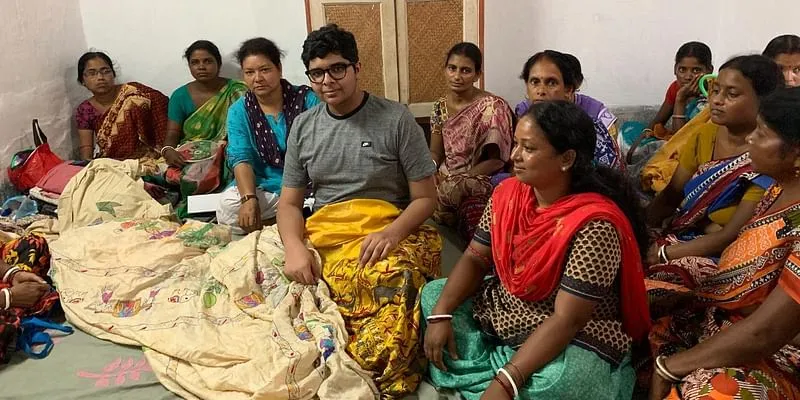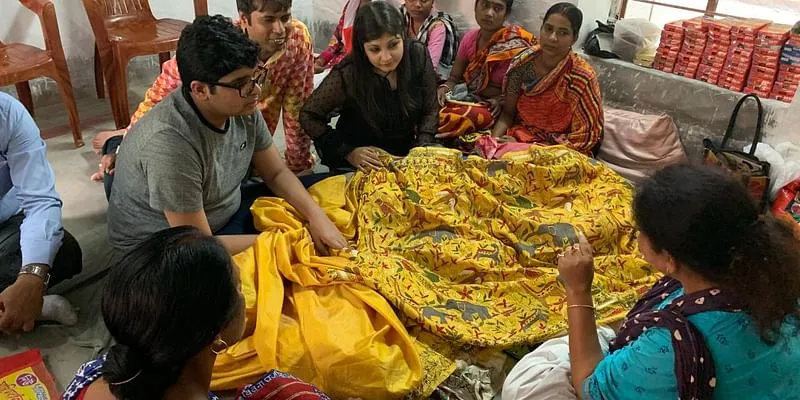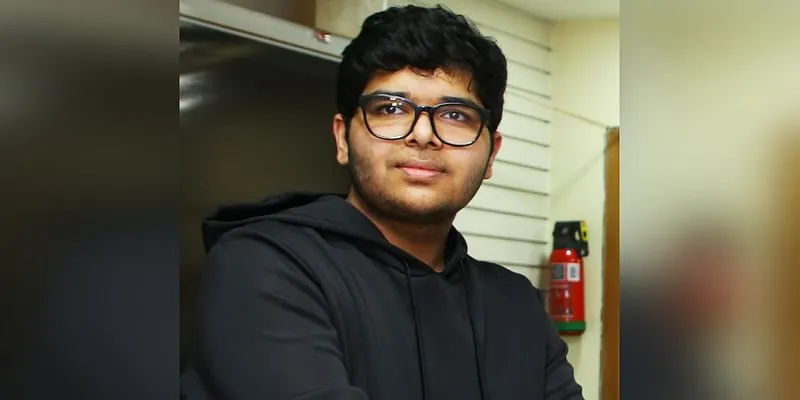This teenager's social ecommerce startup is helping artisans become economically sustainable
Delhi-based Kartikeya Goel started Karfa, a social ecommerce venture, in 2018 to enable artisans to sell their products at a profitable price and help them become economically sustainable.
India has always had a rich cultural history, and that is reflected in our clothes. The vibrancy of our clothes come from the exceptional skills of our handicraft artisans, who are known for their craftsmanship, excellence of design and form, and a unique sense of colour.
According to a KPMG study, around 7.3 million people in India depended on handicraft and allied activities for livelihood. In the last financial year alone, the handicraft and handloom sector earned Rs 39,069 crore through exports and Rs 2,87,678 crore domestically.
However, even before the pandemic struck India, the artisans had been facing many problems including bad working conditions, facing exploitative practices, irregular supply of raw materials, and even problems in raising loans. Along with that, their products were being sold below the market price. As per organisations such as Chitrika and Abhihaara, the artisans would only earn between Rs 3,000-Rs 8,000 per month.
“There were artisans who were doing the kantha stitch or making the dogra jewellery, and their creations could be sold at a very good price on the market but they were being exploited by a lot of middlemen. I could see their conditions was a result of exploitative practices on the market and their working conditions were very bad, some didn’t even have proper clothes to wear,” Kartikeya Goel, Founder of Karfa, tells SocialStory.
This led Kartikeya to start Karfa, a Delhi-based social ecommerce venture that aims to provide a free and fair market to every artisan who wishes to sell their product at a profitable price. The startup — its name a conjunction of ‘kaarigar’ and ‘fashion’ — charges two percent of the price as their operational charge.

Kartikeya Goel, Founder of Karfa, interacting with artisans
Looking at fashion from a social angle
A recent pass out of DPS Vasant Kunj, Delhi, Kartikeya always had an eye for fashion.
“Since I was four years old, the only magazines that I liked to read was Vogue or Elle. I would flip through the pages and glare at the pictures, outfits, and models wearing those outfits, and I would get lost in a different world, imagining myself surrounded by them. I would dream of creating these outfits one day. Sadly, I cannot design but I’m very good at visualising and styling, and that’s how my interest began,” he recalls.
The teenager would often frequent artisan fairs such as the Shanti Niketan Mela in West Bengal with his parents, which left a deep impression on him.
Recalling an incident from his interactions at Birbhum, West Bengal, which houses several artisan clusters, he met Lakshmi, a Kantha embroidery expert who is a single mother of three daughters. Kartikeya saw her struggles to keep her household running from selling Kantha items and noticed that she would take three months to complete the Kantha embroidery of a saree, for which she would be paid only Rs 1,500. The saree itself would be sold at a minimum profit of Rs 10,000.
“The reason why Indian artforms are dying today is because the profession is not economically sustainable. I would see the artisans not getting an equal price for their products, and they were struggling to get a price at which they wanted to sell,” he adds.

Kartikeya Goel, Founder of Karfa, interacting with artisans
He also volunteered at Healthy Kids, Happy Kids Foundation in Hyderabad in 2016 under Dr Satish Sikha, a philanthropist who would train artisans and create a market for them to sell their product. That’s when Kartikeya realised that he could start his own brand which would provide a small income to the artisans.
So, he founded Karfa in 2018 and incorporated the company in 2019. As he was underage at the time of founding the brand, his parents, who have always been supportive of his interests, stepped in to help and his mother took over the company registration.
“Like other teenagers, I used to follow western fashion and I forgot about the rich fashion that was here in India. If we have to keep the identity of India alive, we must keep our fashion alive as well. If we want to preserve India’s rich history and heritage, we have to preserve its artforms as well. For that, the artists need to be paid their due,” Kartikeya says.
Karfa has till now provided a level playing field for 1200 skilled artisans across five clusters from West Bengal, Punjab, Varanasi, and Jharkhand. The ecommerce venture has also received $25,000 as seed funding from trendia.in in March 2019.

Kartikeya Goel, Founder, Karfa
COVID-19 impact and the road ahead
The nationwide lockdown induced by the coronavirus crisis has impacted many artisans, several of whom have lost their livelihoods. Kartikeya recalls an incident where a Madhubani artist reached out to him for employment, and he gave him a consignment to make 100 face masks.
“For many people, especially people working in the Birbhum district, they didn’t know what social distancing was or how deadly the virus is. All they knew was that they couldn’t work and their livelihoods were affected. That had been their only source of income and that’s what their families had been doing for generations,” he says.
The lockdown has also impacted the functions of Karfa as their sales have stopped and a few volunteers who had been working with the brand also began to look for other avenues. On top of that, as the startup is just two years old, Kartikeya says that competing with giants like Amazon is also becoming a challenge.
As of now, the brand is revamping the website and Kartikeya is looking for more co-founders as well as investors. The teenager recently got admitted to Babson College, US to study entrepreneurship, and he plans to get the brand incubated there itself.
Edited by Anju Narayanan








